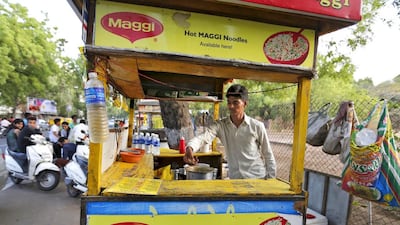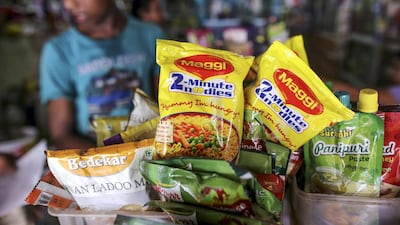Aurea Pereira, a teacher in Goa, used to buy five or six packets of Maggi noodles a week for her three children. That was until the product was banned in India just over a month ago after the food safety regulator said tests had revealed excessive levels of lead.
Maggi noodles, produced by the Indian subsidiary of the Swiss food giant Nestlé, were hugely popular across India and the three-decade old brand had an 80 per cent share of the country’s instant noodle market. A 70-gram packet of its masala noodles was priced at just 12 rupees (70 fils).
The Bombay High Court in the latest hearing on June 30 informed Nestlé that it was allowed to export its noodles – although the ban on sales within India remains in place. The next hearing is scheduled for Tuesday.
Nestlé exports the noodles to countries including the United States and Britain. British and Canadian food regulators this month declared the noodles safe for consumption. Reports suggest that Nestlé is working on a strategy to relaunch its Maggi products in India. Maggi noodles in the UAE are imported from Malaysia.
Ms Pereira says she will buy Maggi noodles when they return to the market as long as the safety of the product content can be assured.
But the packaged food market in India has been hit in the wake of the ban, and experts say that Nestlé will have to invest heavily to regain consumers’ trust in its product.
“The implications of the Maggi case for India’s packaged food sector is negative,” says Kamal Sen, the president and chief executive of Cogitaas, a management consultancy. “It will also have a negative impact on investment in the food sector.”
The Food Safety and Standards Authority of India described the noodles as “unsafe and hazardous” because of lead content and a breach of labelling standards on monosodium glutamate (or MSG) in the product. Nestlé recalled billions of rupees worth of noodles but insists that its Maggi noodles are safe and is challenging the ban in court.
Last Monday, a senior official from the Associated Chambers of Commerce of India said that food manufacturing companies were concerned about the impact of the Maggi case on their expansion plans and that they were facing “increased harassment” from safety inspectors. The companies said there had been a 90 per cent fall in instant noodle sales following the ban.
“There is no standard protocol for testing in different states and manufacturers are not given enough time to take remedial measures,” said the official.
“If there is a feeling that all food companies are rogue and consumers stay away from packaged food, who is going to invest?”
Last Tuesday, the Press Trust of India news agency said that Nestlé paid 200 million rupees to Ambuja Cements to help destroy the recalled noodles at its cement plants.
Maggi is likely to lose $200m in brand value because of the situation, according to Brand Finance.
Analysts say that the impact has gone much deeper, however.
“The bigger challenge they have is not only for Maggi as a brand but for the instant snacking category,” says Nitin Mantri, the president of the Public Relations Consultants Association of India and the chief executive of Avian Media. “It has taken a big hit. The industry and Nestlé have to start rebuilding trust in instant food, that it’s safe for consumption. People are now actually looking at instant food with scepticism and their strategy or rebranding needs to start from there.”
Mr Mantri says that as well as getting clearances and certificates from authorities, Nestlé could also use a brand ambassador to tell the public that the product is safe for consumption, such as a Bollywood or cricketing star. Such celebrities hold a lot of influence over the masses in India, he says.
The actor Amitabh Bachchan is among the Bollywood stars who had endorsed Maggi noodles.
“You could get the food industry together and work with the government to set the standards they are going to follow and have a collaborative approach,” says Mr Mantri.
With the right strategy and handling of the situation, the popularity of the Maggi noodle product is such that the brand could stage a recovery when it returns to the market, he says.
“Can they recover? Yes, absolutely they can recover,” says Mr Mantri. “Cadbury, Pepsi, and Coke recovered in the past, so there are good precedents set in the Indian market that they can recover. Public memory is short in India.”
The southern state of Kerala temporarily banned the manufacturing and sale of Coca-Cola and Pepsi in 2006, while other states issued partial bans on the drinks, following a report claiming that they contained harmful pesticides.
In another high-profile case, worms were found in chocolates manufactured by Cadbury India in 2003. Soon after this, the company launched an advertising campaign featuring Bachchan and managed to recover from the incident.
“It’s a difficult task,” says Sanjay Chakraborty, a marketing communication adviser based in Ahmedabad in Gujarat. “The entire food industry should come together and have a campaign saying what is good and what is bad, how much is permitted and how much is not permitted. It would help not only Maggi but it will help the entire industry. Today it has happened to Maggi. Tomorrow it could happen to someone else.”
Indian consumers would be willing to “give Maggi a chance” if the company tackles the issues “head on”, complies with the standards, and is endorsed by credible authorities, he says.
The US food and drug administration (FDA) website reveals that it has rejected a number of Indian snack products in recent months. Such products have failed to be approved for export to the US because of reasons including issues with labelling, contamination of pesticides and even salmonella, according to the FDA.
There are differences in manufacturing standards in India compared to other countries. The level of lead that is permitted in food products in India is far higher than that in the UK, for example.
Mr Mantri believes that much more needs to done to enforce food manufacturing regulations.
“I think that India has the right laws in place,” he says. “Where India can do better is with enforcement of these laws. We lack enforcement.”
Mr Sen points out the fact that other food authorities globally have cleared the noodles raises questions.
“Indian and international standards need to be aligned with clear and transparent guidelines for all producers,” he says.
business@thenational.ae
Follow The National's Business section on Twitter



